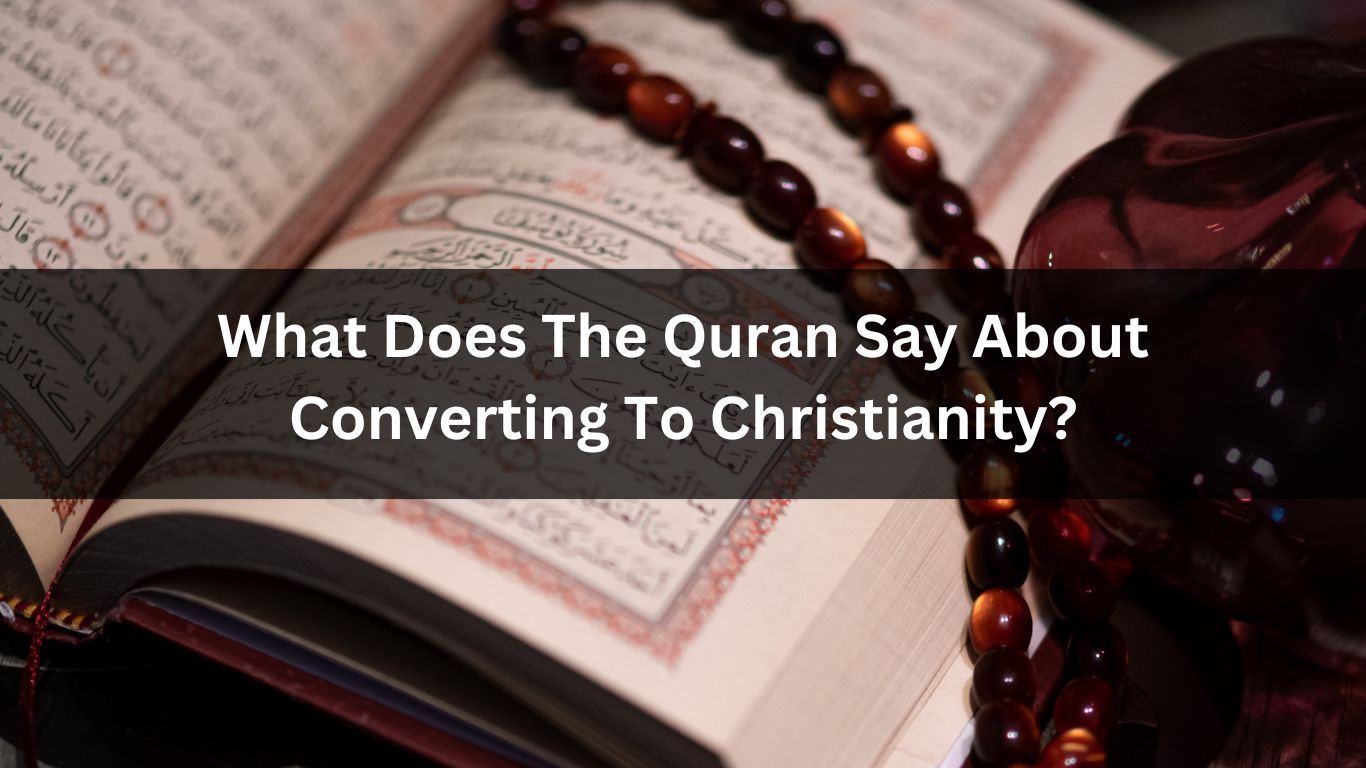If you’ve ever wondered what the Quran says about converting to Christianity, you’re in the right place! Exploring different religious beliefs and their perspectives on conversion can be fascinating.
While it honors Jesus as a prophet, converting to Christianity is seen as deviating from Islam’s monotheistic principles. It warns against associating partners with Allah (5:72), urging adherence to Islamic teachings. Yet, Quranic verses stress respect and tolerance towards people of other faiths (60:8).
So, let’s dive into this topic and discover what insights the Quran offers on converting to Christianity.

The Islamic View on Converting to Christianity
Islam asserts that it is the final and complete revelation from God, and Muslims believe that the Quran provides guidance for all aspects of life, including matters of faith and religious conversion. In the Islamic faith, converting to Christianity is generally considered undesirable and discouraged. This perspective is based on certain principles and teachings within the Quran and Islamic tradition.
1. Islamic Monotheism
Central to Islamic beliefs is the concept of monotheism, the belief in the oneness of God. Muslims believe there is no deity except Allah and that associating partners with Him is seen as a grave sin.
Consequently, converting to Christianity, which is considered to have a Trinitarian belief in God, can be seen as a contradiction to Islamic monotheism. The Quran specifically condemns associating partners with Allah in several verses, emphasizing the importance of pure monotheism.
2. Islamic Prophetology
According to Islamic teachings, Prophet Muhammad is the final messenger of Allah, and the Quran is the last divine revelation. Muslims believe that accepting Prophet Muhammad’s prophethood is a fundamental aspect of their faith.
This belief is exemplified in the Quran, which contains numerous verses asserting Muhammad’s status as the Seal of the Prophets. Converting to Christianity, which does not recognize Muhammad as a prophet, may be viewed as rejecting this core Islamic belief.
3. Islamic Religious Identity
Islam places great importance on maintaining a distinct Islamic religious identity. Conversion to another faith, such as Christianity, can be perceived as abandoning this identity and the community of believers.
The Quran encourages Muslims to remain firm in their faith and not to waver or turn away from the teachings of Islam. Therefore, converting to Christianity may be seen as a betrayal of one’s Islamic religious identity.
Additional Aspects of Islam’s Perspective On Conversion To Christianity
In addition to the foundational principles mentioned above, there are other aspects of Islam’s perspective on converting to Christianity that are worth exploring. These include the consequences of apostasy, the importance of seeking knowledge, and the role of respect and peaceful coexistence with people of other faiths.
1. Apostasy and Consequences
Within the Islamic tradition, apostasy, which refers to the act of renouncing or abandoning the Islamic faith, is generally regarded as a serious offense. While the Quran does not prescribe a specific punishment for apostasy, it does contain verses that warn against abandoning Islam. Islamic jurisprudence and practices vary regarding the consequences of apostasy, with some Muslim-majority countries instituting laws that may include severe penalties for those who leave Islam.
2. Seeking Knowledge and Understanding
In Islamic teachings, acquiring knowledge and seeking to understand one’s faith and the beliefs of others is strongly encouraged. The Quran emphasizes the importance of wisdom, intellect, and critical thinking.
Therefore, it is essential for Muslims to familiarize themselves with their own faith and engage in respectful and informed dialogue when it comes to matters of religious conversion.
3. Respect and Peaceful Coexistence
The Quran promotes the value of respect, tolerance, and peaceful coexistence with people of other faiths. Muslims are encouraged to engage in dialogue and maintain good relations with those of different religious backgrounds.
While converting from Islam to Christianity may be regarded as unfavorable within Islamic teachings, it is essential to approach such matters with respect and mutual understanding, emphasizing the importance of peaceful coexistence and religious freedom.
Summary
The Quran states that there is only one true faith, and converting to another religion is seen as a betrayal. Muslims are encouraged to stay firm in their faith and not to stray away.
However, individuals have the right to choose their own religion, as freedom of religion is a fundamental human right. It’s important to respect and tolerate others’ beliefs, even if they differ from your own. It’s essential for everyone to live in harmony and promote understanding and acceptance among different religions and cultures.
FAQs Of What Does The Quran Say About Converting To Christianity?
Can a Muslim convert to Christianity according to the Quran?
The Quran encourages Muslims to have faith in Allah and follow the teachings of Islam. It emphasizes that Islam is the final and complete religion. Therefore, according to the Quran, converting from Islam to any other religion, including Christianity, is not endorsed.
What does the Quran say about apostasy?
The Quran does not explicitly mention the punishment for apostasy, or the act of leaving the Islamic faith. However, some scholars believe that certain verses suggest the punishment of apostasy, ranging from societal ostracism to severe penalties. It’s important to note that interpretations on this matter differ among Islamic scholars and communities. Many Muslims emphasize the importance of personal conviction in matters of faith.
How does Islam view interfaith marriages?
Islam allows Muslim men to marry women from the “People of the Book,” which includes Christians, Jews, and other Abrahamic faiths. However, for a Muslim woman, marrying a non-Muslim man is generally discouraged in traditional Islamic interpretations.
Can a Muslim read or study the Bible?
Yes, Muslims are permitted to read and study the Bible, including the Old Testament and the New Testament, for educational or informational purposes. Islam recognizes the significance of the Bible as a religious text within the Abrahamic tradition.
How should Muslims interact with Christians?
The Quran encourages Muslims to interact with Christians, and people of different faiths, in a manner that fosters peace, understanding, and mutual respect. The Quran emphasizes the importance of engaging in dignified dialogue and treating others with kindness and fairness.

Nasir is our resident expert with 5 years of experience in business development and marketing strategies. With a keen eye for market trends and a knack for creating impactful campaigns, Nasir helps drive our vision forward with innovative solutions and data-driven insights. His articles provide valuable perspectives on navigating the ever-evolving world of business.

